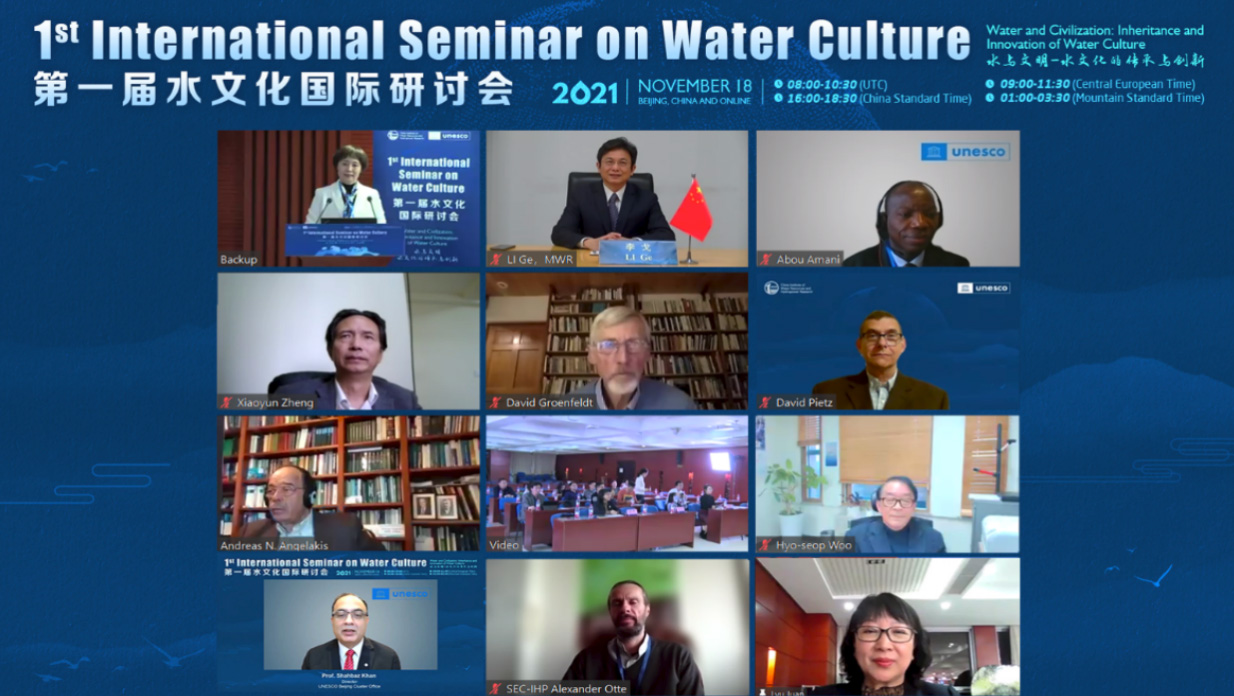 November 18, 2021
November 18, 2021 Beijing, China
Beijing, China
On November 18, 2021, the 1st International Seminar on Water Culture, jointly organized by the China Institute of Water Resources and Hydropower Research (IWHR) and the United Nations Educational, Scientific and Cultural Organization (UNESCO), was successfully held both virtually and offline. Deputy Director General of International Cooperation, Science and Technology Department, MWR, China; Peng Jing, Vice President of IWHR; Shahbaz Khan, UNESCO Representative to China; and Abou Amani, Director of the Division of Water Sciences, UNESCO Secretary of the Intergovernmental Hydrological Programme (IHP) delivered speeches at the Seminar. Experts and scholars from Asia, the Americas, Europe, and Africa gathered to exchange insights on the preservation and innovation of water culture.

Water, the source of life, forms the foundation of all cultural development. The 2030 Agenda for Sustainable Development, adopted by all UN Member States, highlights for the first time the importance of culture, calling for increased efforts to protect and safeguard the world's cultural and natural heritage. The seminar, themed "Water and Civilization - Inheritance and Innovation of Water Culture," aimed to inspire deeper reflection on the relationship between water, society, and civilization.
Li Ge emphasized the seminar's significance, highlighting that water culture is a key component of Chinese culture and a valuable asset to global civilization. He reiterated the Chinese government's commitment to the preservation and innovative development of water culture, as well as its active promotion of international cultural exchange and multi-level dialogues to foster global cultural prosperity. To support these efforts, the Ministry of Water Resources has issued specific guidelines, Guiding Opinions on Accelerating the Promotion of Water Culture Construction, aimed at preserving and flourishing the heritage of water culture and its management, while enhancing the dissemination of contemporary water culture to support high-quality water management development in the new era. Li Ge expressed his hope that international organizations, research institutions, and universities would deepen cooperation in water culture to contribute to the mutual learning and exchange of global water civilizations.
Peng Jing remarked that water culture is a shared wealth of global civilization and a vital link in fostering cultural exchange among nations. She emphasized that water research has always been at the core of IWHR's mission, with the study of water history and culture being one of its foundational focuses. In this way, IWHR shoulders the mission of the inheritance and innovation of water culture. She reflected on the ancient Chinese philosophy encapsulated in the phrase, "The highest goodness is like water. Water benefits all things and does not compete." as an expression of the essence of Chinese water culture. She also noted that IWHR interprets this philosophy in the context of contemporary water science, embodying a modern spirit of innovation, pragmatism, and dedication. She hoped that the seminar and ongoing collaborative efforts would promote the shared development and innovation of water culture globally.
Shahbaz Khan congratulated the successful convening of the seminar and emphasized water's fundamental role in the continuity of human civilization. Throughout history, he noted, all great civilizations have thrived near water sources. He referenced 2006, when the UN chose "Water and Culture" as the theme for World Water Day, recognizing the vital role of water in cultural heritage. He also commended the Chinese government's efforts and achievements in protecting river civilizations and promoting excellent water culture. He also expressed that UNESCO Beijing would strengthen cooperation with China to preserve cultural heritage and jointly build an ecological civilization.
Abou Amani praised the innovative theme of the seminar, emphasizing the importance of incorporating historical wisdom and practices into modern water management, especially in the face of climate change and water-related challenges. He stressed the need for research on water culture and history, as well as public education, to foster solutions that blend the past with the present. He also called on countries to draw inspiration from each other’s ancient water wisdom and apply it to contemporary governance, promoting nature-based solutions to achieve harmonious coexistence between humanity and nature, and advancing sustainable development.
During the seminar's keynote session, eight experts and scholars from China, the United States, Greece, South Korea, and Cameroon presented technical reports on the research and inheritance of water culture across different countries and ethnic groups. Topics ranged from the historical evolution of the Yongding River and the urban development of Beijing, to the relationship between Native Americans and water culture, prehistoric hydraulic technology in Greece, the revival of water customs in East Asia, and the integration of biophysical and sociocultural aspects of the Sanaga River in Cameroon. Discussions also covered how water culture drives innovation in water management and the reconstruction of water culture in the context of climate change. Shahbaz Khan also introduced UNESCO's latest publication, River Culture.
The seminar was hosted by the China Institute of Water Resources and Hydropower Research (IWHR). With over 80 years of development, IWHR is China’s largest and most academically influential research institution in the fields of water history, water culture, and the history of water-related disasters. IWHR has accumulated significant experience and achievements in collecting water culture materials, building water history literature databases, protecting water heritage, and conducting research on water-related disasters.